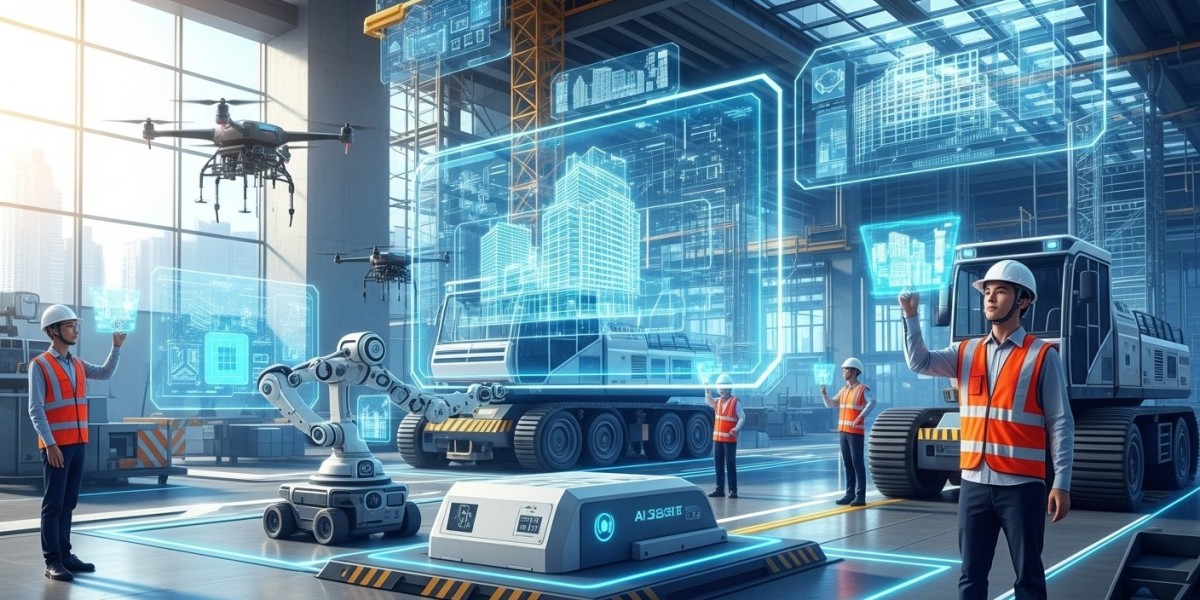The construction industry is one of the most challenging but the most dynamic industries that need to be precise, coordinated, and efficient at all levels. Artificial Intelligence (AI) has emerged as a disruptive technology with the increased need to accomplish projects with greater speed, more security, and at a lower cost. AI allows construction companies to become automated, enhance decision-making, and identify possible risks even before they happen.
AI-based tools are transforming the manner in which projects are done and managed in terms of design and planning, as well as safety management and cost estimation. Due to the ability to analyze large volumes of data and create real-time insights, AI assists companies in optimizing their performance, minimizing waste, and improving their productivity. With the continued advancement of technology, the incorporation of AI in construction environments is becoming a necessity in ensuring the development of smarter and safer constructions that are also sustainable.
1. Enhancing Project Planning and Design
AI contributes significantly to the more precise planning and design of a project, with the help of information-driven knowledge. And through Building Information Modeling (BIM) combined with AI, contractors and architects will have the power to build intelligent 3D models that will simulate a construction project before it has started. Such models point out design conflicts, structural problems, or inefficiencies at earlier stages where teams can make alterations that do not necessitate expensive on-site modifications.
Artificial intelligence-based design tools may also be used to study previous project records, localized building regulations, as well as the availability of materials to suggest more efficient and sustainable design. AI enables the elimination of mistakes and maximizes designs, which will allow projects to be launched on the right basis, both physically and financially.
2. Better Cost Estimation and Budget Control
Proper cost estimation has never been easy in construction. Even a small mistake in pricing or material calculation can lead to major budget overruns. A skilled construction estimator uses data-driven insights and technology to analyze past projects, material costs, and labor trends to produce highly accurate cost forecasts helping contractors stay on budget and bid with confidence.
The construction estimating software based on AI is developed based on machine learning algorithms that identify trends in past projects; therefore, it can estimate future costs more accurately. It is also possible to update the estimates automatically using these systems when market prices change, and this allows companies to have closer control over the budget and avoid financial shocks when developing the construction.
3. Boosting On-Site Productivity and Efficiency
Robotics, drones, and autonomous equipment are AI technologies that are transforming the on-site operations. Robots with AI will be able to cope with the work of repetitive or dangerous jobs, such as laying bricks, pouring concrete, and welding, which will give the person less physical activity and increase accuracy. It is possible to use drone AI vision systems to track progress in real-time, record air shots, and prepare reports on the current state of affairs on the site or the use of materials.
Also, AI-driven scheduling software can assist managers in assigning tasks efficiently through forecasting possible bottlenecks and recommending a superior workflow. This enables the groups to maximize resources and ensure a steady flow in more than one job location.
4. Enhancing Safety and Risk Management
One of the most important issues in the construction industry is safety. The safety level can be enhanced dramatically with the help of AI, which is capable of predicting possible hazards and preventing accidents prior to their occurrence. The cameras and sensors with AI can track the workers at any time, identifying any unsafe habits like helmetless riding or access to restricted zones.
Predictive analytics allow AI to examine past data on safety and discover patterns, leading to accidents, e.g., weather conditions, or fatigue of workers or equipment malfunction. This enables the construction managers to be proactive on the preventative measures. Worn objects that run on AI can even warn the workers if they are exposed to danger of injury because of unsafe movement or are close to heavy machinery.
5. Streamlining Supply Chain and Material Management
The project delays and cost increases are very often caused by supply chain inefficiencies. AI can streamline the process of ordering and delivering materials (Predicting demand, monitoring inventory, the most cost-effective suppliers).
Machine learning algorithms are used to predict material shortages or price fluctuations based on historical purchasing data, lead times, and market trends. This will enable firms to place orders in advance or change project schedules based on that. AI is also useful in smart logistics, whereby materials are automatically monitored between the suppliers to construction sites, reducing waste and enhancing transparency in the entire supply chain.
6. Supporting Sustainable Construction Practices
The concept of sustainability has already gained special importance in modern construction, and AI assists companies in creating and constructing more environmentally friendly buildings. Analyzing the data of buildings, AI can suggest sustainable materials, maximize energy use, and minimize waste production.
As an example, AI-based applications can model the energy consumption of a building in various circumstances and propose design changes that minimize the energy usage. In the construction process, AI can be used to keep track of waste volume and define possible chances of reusing material or recycling it. These are intelligent insights that enable firms to comply with environmental principles, minimise their carbon footprints, and attract environmentally-conscious consumers and investors.
7. Improving Quality Control and Maintenance
Another field where AI has proved to be very promising is quality assurance. AI can improve real-time surveillance of construction work using computer vision technology to match the images on-site with a set of digital blueprints. This enables it to detect deviations, cracks, misalignments, or any other quality problems in real-time, therefore, time-saving, and ensures that projects follow rigid standards.
The use of AI after construction, the technology aids predictive maintenance by tracking the performance of buildings and notifying when their maintenance or services are necessary. As an illustration, sensors built into buildings have the capability of gathering information on the temperature, humidity, and stress levels. Using this information, AI predicts when the building requires maintenance before issues arise and become critical, increasing the lifespan of the building and lowering the capital expenditure in the long term.
8. Enhancing Decision-Making with Predictive Analytics
Massive data processing stands as one of the potential benefits of AI to construction companies in terms of decision-making. Predictive analytics enables managers to know the project delays, financial risks, or manpower shortages in advance. Using the information from various sources in real-time, including weather predictions, equipment utilization, and the productivity of the workforce, AI can deliver actionable insights, allowing leaders to make informed decisions within seconds.
Besides enhancing the efficiency of a project, this is a proactive approach that enhances confidence among the stakeholders, clients, and investors. Essentially, AI transforms raw construction data into an asset that can be used to create smarter, quicker, and safer decisions at every phase of the project.
9. Enhancing Collaboration and Communication
Use of AI-driven platforms is changing the way construction projects are worked on by teams. The latest project management tools with AI have centralized communication, documentation, and scheduling features, enabling both architects, engineers, contractors, and clients to remain in tandem.
Even the summarization of the meeting notes, the analysis of the emails, or the detection of possible miscommunication before it goes out of control can be provided by the Natural language processing (NLP) technology. Artificial intelligence chatbots and virtual assistants can also facilitate the process of coordination by responding to questions, monitoring tasks, or giving immediate updates on the project. This increased communication leads to teamwork, reduced misunderstandings, and keeps everyone on track throughout planning to the end.
10. Reducing Delays and Cost Overruns
Delays and overruns in a project are some of the common situations in construction, which are mostly due to unforeseen circumstances or improper planning. AI prevents these risks by constantly keeping track of project progress, resource utilization, and schedules. Whenever the system identifies indicators of delay, say, material shortages or scheduling, it informs the managers and suggests remedies.
AI is also compatible with the project management software that will help them automatically revise schedules, redistribute resources, and create new progress reports. Such automation can be useful in ensuring that projects remain on schedule, accountability is increased, and there is improved efficiency.
Conclusion
AI is also transforming the construction sector at a very high pace because it is making the industry more efficient, more precise, and sustainable. AI has presented viable solutions to the issues that have existed in the industry since the inception of project design and cost estimation, all the way to safety checks and predictive maintenance. The companies in the construction sector that adopt AI technology will enjoy a competitive advantage due to smarter planning, lower costs, and better quality of projects.
With the industry keeping changing, the use of AI will not be a choice anymore, but rather a necessity for companies that want to succeed in the digital construction age.
FAQs
How is AI used in construction projects?
Design optimization, cost estimation, safety monitoring, scheduling, and predictive maintenance are all based on AI, and it helps construction companies to become more efficient and error-free.
Can AI help reduce construction costs?
Yes. The opportunities to save costs are recognized with the help of AI to optimize material usage, enhance scheduling, forecast prices, and reduce waste or delays.
What are the biggest benefits of AI in construction?
The core advantages are increased productivity, safety, improved decision-making, precise cost estimation, and sustainable building concepts.







